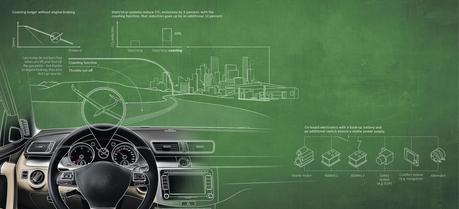 The innovative technology stops the engine when the vehicle is in motion, so that it does not consume any fuel. Whenever the vehicle can maintain its speed simply by rolling — for instance on a gentle incline — the engine is stopped. As soon as the driver touches the gas or brake pedal, the engine starts up again. (Credit: Robert Bosch GmbH)
The innovative technology stops the engine when the vehicle is in motion, so that it does not consume any fuel. Whenever the vehicle can maintain its speed simply by rolling — for instance on a gentle incline — the engine is stopped. As soon as the driver touches the gas or brake pedal, the engine starts up again. (Credit: Robert Bosch GmbH)
Bosch, a German multinational engineering and electronics company, has developed a new start-stop coasting system that enables drivers of vehicles with combustion engines to travel in zero-emission, noise-free, and low-resistance mode over large parts of their journey.
Today, thanks to double-clutch transmissions, some vehicles already have a “light” version of the coasting system on board. As soon as the drivers take their foot off the gas pedal, the system switches the engine to idle. While this means the vehicle is doing no more than rolling, it is still consuming fuel in order to keep the engine ticking over.
Bosch start-stop systems stop the vehicle’s engine altogether. The first generation of the system stops the engine only when the vehicle is completely stationary, while the enhanced start-stop coasting system cuts the engine as soon as the vehicle is coasting to a halt—for instance at a red light. In contrast, as soon as the driver’s foot is off both the gas and the brake pedal, vehicles equipped with the new start-stop coasting function stop the engine while the vehicle is in motion. That saves even more fuel. And because the engine is disengaged, the vehicle can coast for longer than it could with an overrun fuel cutoff system, for example.
Whenever the vehicle can maintain its speed simply by rolling—for instance on a gentle incline—the start-stop coasting system stops the engine. As soon as the driver touches the gas or brake pedal, the engine starts up again.
Tests carried out by Bosch have shown that the combustion engines runs needlessly about 30% of the time, meaning that the vehicle could simply coast for about a third of every journey. Although these phases are not taken into account in the New European Driving Cycle (NEDC), under real traffic conditions the start-stop coasting function is expected to give drivers a roughly 10% fuel saving.
“The start-stop coasting function is affordable, can be combined with any type of combustion engine, and substantially reduces fuel consumption,” says Dr. Rolf Bulander, member of the board of management of Robert Bosch GmbH.
Much of what makes the system innovative is its enhanced software and the use this makes of existing sensor data. Furthermore, the start-stop starter has been configured to cope with greater loads and to deliver faster restarts. In other respects, the start-stop coasting system requires few additional components and can be integrated in just about any vehicle in the world.
Reduced fuel consumption also means lower CO2 emissions. In Germany, some three million new vehicles were sold in 2012. According to statistics, the annual average distance driven is around 11,500 kilometers. If every new car were equipped with the coasting system and emitted just ten grams less CO2 per kilometer as a result, the theoretical annual reduction in CO2 would amount to over 30,000 metric tons.
“Bosch is confident that start-stop coasting will soon become an everyday feature in cars—just like air conditioning,” says Bulander. According to the company, the newly developed start-stop coasting system can operate with any combustion or hybrid engine and thus has a wide range of applications.

